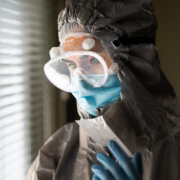Safe takeout options under coronavirus

By Nailah John, Linda Golodner Food Safety and Nutrition Fellow
The way we get food now has totally changed due to the Covid-19 virus. Most us around the nation no longer go to our favorite bar or restaurant or stop at the local coffee shop for a bite to eat or to socialize and have a drink. The mandatory closure shutdown of restaurants with the exception of takeout or delivery is our only option of enjoying a meal not cooked at home. Beyond that, we may ask the questions: first is it safe? Second: is it ethical to potentially expose a delivery worker to what we are all trying to avoid the risk of Covid-19?
The answer to the first question is yes, with some caveats. Currently food is not associated with the transmission of Covid-19, according to the *CDC and the *Food and Drug Administration. However, Vox reports that there is growing evidence of fecal/oral transmission, which means you can ingest the virus shed in feces through inadequate handwashing or contaminated food and water. Therefore, handlers of food who carry the virus can spread the virus to food items. In theory, all restaurants have to follow *food safety rules, and there are extra measures that have been put in place due to Covid-19. However, we have seen Chipotle and other restaurants spread infections by poor food handling.
The second question is complicated, but here are some thoughts. Currently delivery workers are in the middle of a pandemic but still have to work to support their families and pay bills. Eater suggests that if customers forego take-out food, delivery workers and restaurants struggling to provide during the crisis could be put out of business.
We recommend ordering take-away food from your favorite restaurants and, even better, support them by buying gift cards for post-pandemic future meals when restaurants re-open.
Your first option is to is use the in-house restaurant delivery option, since third-party apps take commission fees, which reduce the profit for restaurants. Here are some apps that are taking the necessary measures in protecting their workers and helping out the restaurant industry.
- UberEats is working to provide drivers with disinfectant. With limited supplies they are working with suppliers to source as much as possible. Any delivery worker who is diagnosed with Covid-19 or is individually asked to self-isolate by a public health authority will receive financial assistance for up to 14 days. UberEats customers have the option to choose how they would like their orders delivered, including selecting “leave at door” during checkout. UberEats has also waived the delivery fee for more than 100,000 independent restaurants across the USA and Canada.
- *Postmates launched the Postmates Fleet Relief Fund to help fleet workers cover medical expenses related to Covid-19, regardless of diagnosis. Active members of the fleet who receive a positive diagnosis for Covid-19 or who are required to self-quarantine based on infection may be eligible to access additional funds to offset up to two weeks of lost income while they recover. Postmates has also introduced non-contact deliveries, which allows distancing between customers and delivery workers. Postmates will also waive commission fees for businesses in the San Francisco Bay area.
- DoorDash (also owns Caviar) is providing financial assistance to eligible delivery workers and Caviar couriers who are diagnosed with Covid-19 or quarantined. DoorDash is consulting with public health officials and working with restaurants to enhance their food preparation protocols. The default delivery method has been changed to the non-contact option to minimize contact between the delivery workers and customers. All new and existing DoorDash partner restaurants will receive commission relief and marketing support.
- *Grubhub is offering a one-time pay adjustment to help with medical expenses and loss of income if a driver tests positive with Covid-19. Grubhub will also support drivers who have been ordered by a public health authority or licensed medical personnel to self-isolate due to a risk of spreading Covid-19, and if a driver’s account has been individually restricted as a result of information provided to Grubhub by a public health authority regarding the risk of spreading Covid-19. Grubhub has also introduced contact-free delivery, which allows customers to request having their delivery left at the front door to avoid less contact.
- On March 9, Instacart introduced a new sick pay policy that all part-time employees including in-store shoppers now have access to sick pay, an accrued benefit that can be used as paid time off for absences from work due to illness or injury. This pay accrual will be backdated from the start of the year for all in-store shoppers. Instacart is also offering 14 days of pay for any part-time employee and full-service shoppers who are diagnosed with Covid-19 or are under mandatory isolation or quarantine directed by local, state, or public health authority. This assist will be available for 30 days. Instacart has also introduced “Leave at my Door Delivery” to all customers across North America.
It is important that we minimize contact with others since daily things are changing in relation to Covid-19. However, delivery services are really stepping up to keep customers safe and, for that, we should all be grateful. Remember to support your local restaurants by requesting non-contact delivery!
*Links are no longer active as the original sources have removed the content, sometimes due to federal website changes or restructurings



















